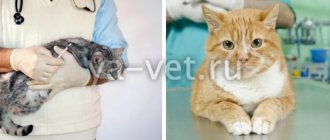Why do pets bite and scratch?
There are many reasons that can provoke aggression. It should be borne in mind that cats have a different way of thinking than humans. It is more associative. Pets perceive not only events as a whole, but also non-obvious details, so any minor circumstances remembered in the past can cause bad behavior.
Errors in education
Most often, the cause of bites and scratches is improper upbringing. In most cases, this happens according to one scenario: a small kitten was once played with with its hands and feet. At the time it seemed funny because the baby couldn't bite through the skin much. Then the kitten grew up and became an adult cat with sharp claws and teeth. The habit of biting their owners remains.
A cat should not perceive a hand as a toy, because a person feeds and strokes the pet with it.
It is necessary to understand that over time, a pet does not become well-mannered on its own. His behavior depends on what his owner puts into him. In addition, cats are conservative and do not like to give in: if they are used to something, they continue to do it, even if the owner interferes and punishes. If you don't want your adult pet to walk around the dinner table, steal food or bite, never allow him to do this at an early age. Once is enough for the habit to stick forever.
Another problem associated with parenting is the incorrect distribution of roles. The cat sees the family as its pack. Depending on the character of the animal and the behavior of the owner, the pet may perceive itself as a leader or a subordinate. Ideally, pets should occupy the last step in the hierarchical ladder: first comes the leader, then other adult family members and children. Only then - cats and dogs.
Sleeping on high places (including in the owner's bed) is one of the signs of dominance, however, in the absence of other manifestations, it may indicate that the pet simply misses the person and lies where his smell is preserved
The leader protects his pack in various ways. The ability to punish and educate your subordinates is one of them. If a cat considers itself a leader, it will condemn any of your actions that it does not like. For example, my cat once got into a furniture box and hissed when we tried to take it away. It seemed to him that we were encroaching on his property. Pets bite and scratch when they try to challenge their rights to leadership: they take things away, punish them, etc.
There is nothing good in such a distribution of roles either for the owner of the animal, or for other family members, or for the cat itself. The latter is forced to defend its territory. Pets are not familiar with the concept of property rights, so they think that strangers and invaders can come into the house or apartment at any moment. Because of this, the cat does not sleep well. She only dozes so that at any moment she can quickly wake up and fight back. This increases stress and irritation.
Character traits
Some cats are less affectionate and don't like to be touched. In the absence of attention from others, they usually behave calmer, since they have no reason to attack: they just want to relax. You can only come to terms with this. Animals are individual just like people, so if your cat doesn’t like being held, it’s best not to do it.
Play behavior
Playful behavior is more typical of small kittens, but with improper upbringing it persists in adult cats. In this case, the pet bites the person not out of aggression or to scare away. Little kittens learn to calculate strength and figure out their position among their siblings through rough play.
When playing aggressively, a cat behaves unconventionally for a pet: it sneaks, bends down to the floor, and at the end makes a dash and attacks.
Fright
Fear can be associated with negative memories and upcoming events. Often it is not possible to immediately detect the cause of aggressive behavior, since in this case it is associated with associations.
Frightened cats most often run away, hide and fight back only if cornered.
For example, a cat once visited the veterinarian for vaccination. There she was given an injection, meaning she experienced pain. In addition, the very change in environment made the pet nervous. From this moment on, the animal can react aggressively to people in white coats or just light-colored clothes. Fright can even be caused by the smell of perfume that the owner used that day, or simply by a person who looks like a veterinarian.
Bad feeling
People often become irritable when experiencing pain or discomfort. In this regard, cats are like us: they can also become short-tempered if they are not feeling well. Some pets, on the contrary, show excessive intrusiveness, ask to be petted and attract attention in every possible way, others hide and regain strength, trying to cope with the illness on their own. Some people cannot stand the pain and take it out on others.
Violation of personal space
If a cat is predominantly aggressive when someone tries to play with or pet it, the problem is almost certainly a violation of personal space. Animals sometimes need rest, peace and security. They do not like to be woken up and petted intrusively, held in place and forced to do anything. Of course, there are cats that are happy to be affectionate and play at any time, but this is only an individual trait.
If a cat used to love being petted, but then abruptly began to refuse petting, this may be due to illness and discomfort when touched.
If personal space is violated, the pet may experience stress. This causes him to be aggressive the rest of the time. If at first the pet bites only when touched, then later it can attack from hiding, protect its own territory, etc.
The most striking manifestation of violation of personal space is aggression during affection. In such cases, the cat does not immediately behave nervously. She begins to bite a little later, when she gets tired of what is happening. For example, my friend’s cat, when I come to visit them, always comes up and asks to pet her. If the pet is ignored, she stands on her hind legs and rubs herself against her trousers, tries to touch her hand with her head, etc. Despite her own obsessiveness and apparent good nature, she herself does not tolerate being petted for more than a minute. She either runs away or bites her hand until it bleeds, as if warning. Her behavior is quite understandable: even a person, if you stroke him on the back for a long time, will first begin to feel irritation, and then pain. A cat is a living creature, so you should respect its interests and not treat it like a plush toy.
Strong smells and sounds
Cats have a more sensitive sense of hearing and smell. For example, the ultrasound from fireworks can cause them to panic. The same applies to strong odors: they are unpleasant for animals and provoke irritation. Some of the most off-putting “scents” include citrus fruits, vinegar, essential oils, perfumes, etc.
It is not difficult to understand that a cat does not like the smell: when approaching its source, the animal grimaces, squints its eyes and may press its ears back
Sounds and smells can evoke negative memories, bad mood, poor health, and even physical pain. This is also true for people: for example, we become nervous if our neighbors take a long time to carry out repairs. Animals are no worse in this regard. They can also lash out at others if they are stressed due to uncomfortable conditions.
Pregnancy and birth of kittens
Hormonal changes and instincts can cause a cat to suddenly change behavior. This is due to the need to protect their nest and kittens.
Maternal instinct is one of the strongest, so a cat, when protecting its offspring, can seriously injure even its beloved owner
Some pets categorically do not allow anyone near their babies, others are more selective and show aggression only towards those they do not trust. In this case, it is advisable not to intervene unless strictly necessary, so as not to make the cat nervous.
Age
Kittens are more playful than adult cats. They can learn to hunt and choose, for example, the owner's legs as a target. If the pet owner also reciprocates, imitates the victim’s behavior and is touched, the situation gets worse: the kitten remembers the reaction, believes that it was rewarded, and later copies its actions.
Boredom
Cats are less active than dogs, but they also need a timely release of energy. If your pet does not have the opportunity to run, jump and play, he will begin to satisfy his needs on his own. Most likely, the owner will not like the “cat” methods. Animals, in order to get rid of excess energy and calm down, can tear furniture, tear up wallpaper, chew wires, bite, scratch, etc.
Hunting
The hunting instinct manifests itself not only in small kittens, but also in already raised adult cats, but in a different way. The animal does not rush to its feet. In this case, aggression is associated with the activation of the hunting instinct and not completing the task.
The appearance of a bird outside the window can lead to tragedy: with vertical ventilation, animals often get stuck in the crack, which leads to a slow slide down, pinching of internal organs and death
This often happens when a pet likes to sit on the windowsill and watch what is happening on the street. If a cat sees a bird outside the window, the hunting instinct will work. The animal may understand that it will not be able to reach the victim, or even try to overcome the glass and bars, but in any case, nervous overexcitation will occur. This will make the cat feel irritable and aggressive. The pet may run around the house and attack its owners or react negatively to attempts to pet it.
One of the most dangerous toys for cats is a laser. I myself once saw nothing wrong with it, it’s convenient: you sit on the sofa, move the beam across the floor, and the cat has fun and runs around. Everyone seems to be having fun. Then I began to notice that after such games my pet kept biting for several hours when I tried to pet him, and was also mischievous. It seemed to me that this was not doing him any good, and we returned to the usual fishing rods and teasing. Later I had a chance to talk about this with the trainer, and he confirmed my doubts. The laser does not allow the cat to realize its hunting instincts. The animal runs after the beam, but cannot catch it. From the pet's point of view, he fails, so he gets annoyed. You can play with the laser only if at the end the cat receives a food reward - a cracker, a small piece of unsalted cheese, food pellets or any other favorite food. Then the hunt is considered successfully completed. However, it is better to prefer more tangible toys.
Negative experience
This factor can be compared to fear, but there is a difference. A cat is not necessarily afraid; it may be nervous or angry. The principle is the same: some event caused a negative reaction in the animal. Non-obvious associations were formed. As a result, the cat shows aggression selectively. For example, she only dislikes children if a child once pulled her tail. It is much more difficult in this regard with selected adult animals, since the owner does not know in advance what can cause aggression in the cat.
Stress
In most cases, aggressive behavior and irritability indicate that the cat is experiencing discomfort. The owner’s task is to find out the cause and eliminate it. Stress can be caused not only by pain, boredom, fear, etc., but also by the lack of personal territory, personal belongings, any changes in the house and other factors. Cats are so conservative that even rearranging furniture or introducing new objects causes them to feel worse in their health and mood.
Excessive licking is one of the signs of chronic stress
Often stress occurs for reasons beyond the control of the owner. For example, a neighbor has a baby, and he often cries at night. Or a new pet appeared behind the wall. In such cases, the owner can only create the most comfortable conditions for the animal: give it a private corner in which no one will disturb its rest. If the cause of irritability was, for example, the appearance of a new cat in the house, the situation becomes simpler: the owner can influence the current circumstances and slowly accustom the pets to each other, as well as promote the correct distribution of roles in the pack with the help of personal support from the leader.
Incorrect adaptation
The reason borders on fear and, in fact, is its offshoot, however, in this case, aggression is caused not by hygiene procedures, visits to the veterinarian, loud sounds and other minor temporary factors, but by lack of upbringing and negative experiences. This is an explosive mixture that can make a cat unpredictable. This is most often observed in street animals. They don't know how to live in a family. If the cat was once injured, the situation gets worse, because the pet has only seen harm from people.
Hissing often indicates fear, because it allows you to scare away an opponent without starting a fight; if a cat really wants to attack, it will attack without threats
In this case, the animal perceives the person as a threat and cannot form a line of behavior. This leads to fear and defensive aggression: the pet hides in a corner, does not come out and defends its territory in every possible way. In such cases, owners are advised not to force events and wait for the animal to become interested and come out on its own. Intervention is possible if the pet is seriously injured or sick. If there are no life- and health-threatening conditions, all that remains is to be patient and gradually earn trust.
How to retrain a pet
There are many methods of re-education, but the choice depends on the specific situation. In some cases, the methods that helped with one cat will only worsen the condition of the second . It is important to first calculate the cause and eliminate it, then eliminate bad habits. When determining the source of the problem, you need to pay attention to the type of aggression. Defensive behavior is more typical of frightened pets; active attacks are typical of kittens and leader cats. Territorial aggression is found in pregnant and postpartum pets.
Survey
Since almost any disease can cause pain, it is advisable to contact a veterinarian and check the well-being of your pet. If there are no specific complaints, the specialist will conduct an examination and take a blood sample for analysis. It is advisable to donate urine and feces: the results may indirectly indicate the presence of inflammation in the genitourinary system or gastrointestinal tract.
Changes in gait and refusal to use the litter tray are among the most common general symptoms of diseases, however, only a specialist can make a final diagnosis after examination.
Sometimes the cause of the malaise is detected by visual examination. These could be itchy spots due to allergies, loose teeth, parasites, etc. If necessary, the veterinarian will order additional tests.
Correcting your daily routine
Cats are naturally nocturnal animals. Most often, a person manages to adjust the pet’s daily routine, but in some cases it remains natural. Then the animal sleeps during the day and gets bored at night because there is no one to play with it. This leads to the accumulation of unrealized energy, nervous overexcitation and stress.
If a cat considers itself a leader, has a habit of biting and is active at night, it will certainly wake up its owner out of boredom, and not in the most delicate way.
To avoid problems with the regime, it is recommended to pay as much attention as possible to your pet during the day. Toys will help redirect aggression and expend excess energy. If the owner does not have the opportunity to play with the cat during the day, you can purchase interactive catapults, food cones, mazes, etc. At night, you cannot get up at the request of the pet, even if it deliberately wakes you up and makes noise. You need to be consistent and persistent: you should stay in bed, and then the cat will understand that such behavior is useless. Even if you had to get up, do not pay any attention to the pet and do not pet it.
Compliance with the rules of communication with animals
Some owners accidentally provoke their cats without knowing it. It should be remembered that animals are different from people: they have their own rules of “etiquette” and methods of communication. It is important to study the body language of both cats in general and your own pet, and learn to understand it. For example, ears laid back and a twitching tail may indicate that the pet is nervous and may soon attack. In this case, it is better to leave him alone.
In most cases, cats prefer to be stroked on the head and near the tailbone, as well as behind the ears; pets allow only those they trust to touch their belly, otherwise they may attack, since this is the most vulnerable place
You cannot be overly persistent. Good-natured attempts to get your pet to eat or play will predictably cause irritation and aggression. Most cats prefer to run away in such cases, but some may fiercely defend their homes and try to drive away their owners.
Loud noises, fast movements and strong smells should be avoided, especially in a new environment or with an unfamiliar animal. You cannot sneak up on your pet or touch it without making your presence known. More temperamental animals react aggressively even to a person’s posture: if the owner leans over the cat, this can be perceived as a bid for dominance and a demonstration of strength.
Redistribution of roles in the pack
The method is suitable for those whose cat became aggressive in adolescence and shows signs of dominance: defends the territory, “punishes” the owners at its own discretion, marks, etc. It is advisable to engage in upbringing while still a kitten, since an adult animal will be less able to assimilate new rules and not to understand why his situation suddenly changed.
The leader’s task is to protect the flock and distribute benefits. You should look like a patron in the eyes of the cat. This means trust, rewarding good behavior and reprimanding wrongdoing.
You cannot punish an animal if it lies on its back: this is a sign of submission
Trust can be earned through predictable and adequate (from the cat’s point of view) reactions to current events, authority, and mutual respect. For example, let's say you take your cat to the vet. If you worry, the animal will sense it. This will lead to nervousness and a feeling of insecurity. In addition, this is inappropriate behavior for a cat: if a threat arises, you need to run away from it, and not go towards it. The correct strategy is to remain calm and try to gently support your pet with affection and warm words. If the cat responds with aggression, you should not touch it, but there is no need to panic. The animal will feel more confident. Since the owner is calm, it means there is no threat, the pet is protected. This will alleviate stress factors and strengthen faith in the owner later, when the cat realizes that nothing terrible was done to her at the clinic.
Rewarding good behavior is offering benefits in exchange for reinforcing desired habits. This helps create positive associations and demonstrate to the pet that it is the owner who distributes the resources of the pack. When my second cat began to react aggressively to attempts to pet her as she grew older, I began to reward her when she sat quietly. I tried to catch more often those convenient moments when my favorite approached on her own. I gave treats before the cat started to get irritated. This helped her understand that affection is nice. The system of associations worked: stroking was followed by receiving a treat, so the cat began to approach more often and stopped getting irritated. After training, I started giving treats less often and gradually removed them completely.
Food is the main resource, so it is advisable not to use automatic feeders and not to leave food freely available, but to demonstratively pour it into the bowl every time
Condemnation of actions is punishment. However, in no case should it consist of beatings. This behavior is not natural for cats, and therefore leads to psychological disorders, loss of trust and increased aggression due to the need to defend themselves. In a natural environment, the leader can grab a subordinate by the withers, press him to the ground and hold him until the latter stops struggling. This is a confirmation of your strength and status. This can be done in cases where the cat is very mischievous and shows a tendency to dominate. It is important to hold the animal until it calms down, otherwise the escaped pet will think that it has defeated you.
The mother cat carries small kittens, holding them by the withers; at an older age, the reflex remains: if you grab an animal by a fold of skin, it will involuntarily relax
In most cases, milder penalties are sufficient. For example, a kitten bit you while playing. The worst punishment for him is to stop having fun. In this way, you will not only let your pet know that he will have to follow some rules, but also confirm his status as a leader by distributing benefits. Ignore the offending kitten for 5–10 minutes. It would be enough.
If there are several cats living in the house and showing aggression not only towards family members, but also towards each other, it may be necessary to help them understand the hierarchy. There is no need to aggravate the situation: you need to place several houses, trays and bowls to minimize conflicts. You can involve cats in joint games. This will bring them closer. If a fight breaks out, you can only intervene if one animal has seriously injured the other. In most cases, when sorting out relationships, cats do not hurt each other, so there is no reason for concern. Ideally, animals should establish an internal hierarchy after the first skirmish, but sometimes this takes longer. If the relationship has become strained, the pets can be separated so that they have additional time to get used to each other.
Small children should not be left alone with pets as they may unexpectedly become aggressive.
The situation is approximately the same when a newborn child appears in the family. The cat does not yet know what level in the hierarchy he will occupy, so he can defend himself in advance and attack the baby. Parents need to carry out educational work with their child and pet separately. Adult children need to be explained the rules of behavior with animals, little children should not be allowed to grab the tail, pull the ears, etc. You cannot scold a child in front of a cat, because the pet will decide that he can also punish a younger family member.
Redirecting Aggression
You can redirect aggression if the cat has a lot of energy, has a powerful hunting instinct, or is simply bored. You need to offer the animal toys and try to provoke them with them so that the pet begins to bite them.
You can buy catnip separately and sew a stuffed toy yourself
It is recommended to prefer products with catnip: they are more attractive to pets. The desired behavior should be reinforced with treats.
Eliminating irritants
It is advisable to save your pet from additional temptations and cover the windows with film. This will also prevent an accident. You should avoid harsh perfumes, do not get other animals if the cat does not get along with anyone, and do not bring guests into the house if the pet reacts negatively to them. Of course, this is not always possible, but it is important to show respect for the individual characteristics of the pet’s psyche.
During the game
Often, it is the people themselves who are to blame for the fact that a kitten shows aggression during play: it is hilarious to watch how a baby of two or three months old, with his ears flattened and his short tail lashing, pounces on the owner’s huge hairy hand and diligently chews a thick finger with his fangs. Several months pass - and a large, angry cat, angry that the owner has taken his favorite place on the sofa, digs into him with claws as sharp as fishhooks, and can easily bite an arm or leg to the bone.
If you want to protect yourself from your pet's aggression, remember a few simple but effective rules.
What to do if you can’t retrain an aggressive cat
If no measures help, you should create the most comfortable environment for your pet. Perhaps the animal is disturbed by some stress factors that cannot be calculated. For example, excessively intrusive attention on the part of the child or lack of a sense of security. A cat house or play area will help you cope with this. No one should touch a cat in a shelter: this is its personal territory.
The play complex will replace not only the house, but also sports equipment, toys and a scratching post
If your pet continues to behave aggressively, you can make a noise trap from a tin can and, for example, nuts. It should be used every time the animal tries to attack. Do not throw a trap at a cat or use it on older cats, small kittens, or pets with heart disease.
Fisher disks are a ready-made alternative to a noise trap
A loud sound in itself will cause a negative association and will wean you off attacks, although it will not get rid of the causes of aggression. In some cases, the projectile can aggravate the situation, so it should be used with caution.
At night
Surely many people know this joke:
“As a child, it seemed to me that at night, if you dangled an arm or leg from the bed, it would immediately be grabbed by a monster lurking there... I grew up and got a cat. The nightmare has materialized."
In fact, night attacks on hosts are rare. This is how small kittens behave, with a well-developed hunting instinct.
If you do not want to become the “prey” of a mustachioed miscreant, stock up on a spray bottle of water or a rolled-up newspaper. As soon as the attack occurs, spray the “hunter” with water or slap him with a newspaper. The most important thing is not to scream in fear if the kitten grabs you by a protruding part of your body. Soon the baby will understand that crime inevitably follows punishment, and will stop attacking you at night.
In general, to prevent night attacks, send the kitten to sleep in another room. This will not only give you the opportunity to rest normally and move around the apartment without the risk of being bitten, but will also create conditions for your pet to sleep soundly. Place an old chair covered with a blanket or a warm bed, a tray and a bowl of water in the cat's bedroom. For the first day or two, your pet may protest, moaning pitifully under the door. Be strong! Very soon the kitten will go on vacation on its own at the right time, and the recent problem can be forgotten.
Personal experience of pet owners
My stepfather has a young cat in Moscow... He and I became very good friends, but he bit and scratched very painfully. Roma (that’s my stepfather’s name) was shocked when I taught Chernysha (the cat’s name) to stop biting. For a long time he could not understand how I did it. It’s simple: using the banal “no”. Now Chernysh is following me on my heels. He plays with me most often. One time Roma was playing with him, I sat next to him and watched TV. Blackie took him and bit him on the hand, and I told him: you can’t! He never bit again!))))
Irishechka
https://forums.zooclub.ru/showthread.php?t=45837&page=3
I remember our military actions))) All the time we had to be on alert and ready to repel an attack. They scolded and splashed water - to no avail. He will run away, hide, and then attack again. A good remedy is fragrant geranium. Poking a leaf in the face of an enraged cat immediately results in complete disgust)) Now Timofey is eight years old and his behavior has become quite adequate. However, he still doesn’t mind biting me when, in his opinion, I do something wrong. In response, he receives a stern shout and a slap on the ears, but can still bar his teeth and attack again with his ears laid back and a piercing scream. He doesn’t respect him, he’s a scoundrel, although he loves him more than the others))) On the contrary, he respects his husband - he knows that he can do whatever he wants with him. He actually does everything: he scratches, he pushes medicine, and he bathes. A cat would have chewed my hands off for this a long time ago. But what can you do, since the alpha male has decided so - you have to obey. The cat is afraid of his daughter, because he knows that she has the impudence and courage to take any action. However, he can bite her only in the most extreme case, and then he grabs her and holds her and looks her in the eyes, saying “got it?”, lets go, and there’s not even a bite of the skin))
marmazette
https://forums.zooclub.ru/showthread.php?t=45837&page=2
My Kira loves to play Tybydymsky horse most of all when I scare her and she runs around the whole apartment. But if you try to cuddle her during this period, she may bite and scratch in the heat of excitement. She has had this since she was young. But you can always see from her when she’s like this and I don’t touch her. If you continue to pester her, she usually hides somewhere, under a chair, for example. Because she knows that if she scratches or bites anyone, she will be scolded. Therefore, she herself avoids these situations. One day her daughter played a prank with her, Kirk lost her temper, and her daughter kept pestering her. I warned her, the cat ran under the chair, my daughter climbed in after her and received several bloody scratches. I started scolding the cat. And I have a daughter - there is no need to provoke a cat if she herself walked away from the conflict.
racooh04
https://forums.zooclub.ru/showthread.php?t=45837











